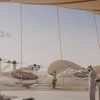Emirates and Saudia Flight Cancellations Cause Travel Disruptions Across the Middle East
Travelers heading to key destinations like Dubai, Riyadh, Dammam, and Jeddah faced significant disruption this week as Emirates and Saudia Airlines canceled multiple flights due to a mix of severe weather conditions and operational challenges. The cancellations and delays have stranded hundreds of passengers, highlighting the vulnerability of Middle Eastern air travel during peak seasons. With Dubai’s growing role as a global hub for business, tourism, and real estate investment, the impact extends far beyond stranded travelers.
Scope of the Cancellations
On August 31, 2025, Emirates Airlines confirmed two major flight cancellations between Dubai and Sialkot (UAE618 and UAE619), while Saudia Airlines reported three cancellations on Riyadh–Jeddah and Riyadh–Dammam routes, with additional delays affecting Dammam. Passengers faced long wait times, limited rebooking options, and increased congestion at Dubai International Airport (DXB) and Saudi Arabia’s primary hubs.
The operational challenges coincided with adverse weather patterns, including sandstorms and high temperatures, which impacted ground visibility, aircraft cooling systems, and scheduling reliability. For a region heavily reliant on aviation for connectivity, these disruptions create cascading effects on tourism, trade, and conferences.
Impact on Dubai Tourism and Real Estate
Dubai, already renowned for iconic landmarks like the Burj Khalifa and Palm Jumeirah, felt the strongest repercussions. Tourists planning luxury getaways and investors attending property exhibitions faced delays, highlighting how air connectivity underpins the emirate’s economy. The disruptions come at a time when Dubai’s real estate market is booming, with branded residences, mega-developments, and off-plan sales driving record transaction volumes.
According to property analysts, Dubai recorded over AED 367 billion in transactions in 2024, with demand in 2025 still surging despite global economic uncertainties. Locations such as Business Bay, JVC, and Arjan remain magnets for international investors seeking stable returns.
Ripple Effect in Saudi Arabia
Saudi Arabia’s aviation hubs in Riyadh, Dammam, and Jeddah also experienced turbulence, with Saudia canceling or delaying multiple flights. These cities serve as gateways for religious tourism, oil sector business travel, and regional conferences. The disruptions not only inconvenienced leisure travelers but also added strain on businesses reliant on punctual connectivity.
Experts suggest that persistent weather-related cancellations could trigger demand for alternative regional hubs. However, with Saudi Arabia’s Vision 2030 strategy focusing on tourism and real estate development, the aviation sector is expected to ramp up investments in resilience and contingency planning.
Why These Disruptions Matter for Investors
The flight cancellations underscore the delicate balance between infrastructure, tourism, and property investment. Dubai’s real estate market thrives on global mobility, with foreign buyers contributing a large share of transactions. Any long-term aviation disruption could influence buyer confidence, especially among investors flying in from Europe and Asia to view new launches by developers such as DAMAC, Sobha Realty, and Azizi Developments.
Still, Dubai’s diversified economy, tax incentives, and investor-friendly policies continue to cushion the city from external shocks. Flight disruptions are seen as temporary, while the long-term growth outlook for Dubai real estate remains positive.
Looking Ahead: Building Resilience
Both Emirates and Saudia Airlines are working to re-accommodate stranded passengers and restore schedules. However, as weather patterns grow increasingly unpredictable, airlines may need to invest more heavily in predictive technology, crew planning, and passenger communication systems. For real estate stakeholders, the resilience of Dubai’s air travel system is crucial to sustaining its status as a global hub for capital and lifestyle.
Ultimately, the cancellations serve as a reminder that Dubai’s success story is intertwined with its ability to remain accessible, reliable, and welcoming. Despite temporary setbacks in aviation, its real estate market and tourism economy remain resilient, supported by robust fundamentals and international confidence.
Conclusion
The widespread disruptions caused by Emirates and Saudia Airlines cancellations highlight the critical role of aviation in the Middle East’s economic ecosystem. For tourists, delays mean missed experiences; for businesses, missed opportunities; and for investors, a reminder of how interconnected travel and real estate truly are. With Dubai at the center of regional growth, its real estate sector continues to thrive, reaffirming its position as a global magnet for investment—even when skies turn turbulent. Explore the latest opportunities on our Aurantius homepage and discover why Dubai remains one of the world’s top destinations for property investment.










